U.S. men’s swimming coach Anthony Nesty initially only swam because his father made him.
“I didn’t enjoy swimming,” he tells TODAY.com in an interview.
“Why he chose swimming, I think, is because of the discipline of the sport,” Nesty adds. “It’s just you and the clock.”
His first swim at 5 in a Learn to Swim program was in the country he grew up in, Suriname, where at the time there was only one Olympic-sized 50-meter pool, Nesty says.
His first swim ultimately turned into USA Swimming tapping him last fall as the head coach for the men’s Olympic team for the 2024 Games in Paris, making him the first Black person to hold a U.S. Olympic swimming head coach position. He previously served as an assistant on the coaching team for the Tokyo Games.
“My dad, he had a vision for me,” Nesty, 56, says.
He says he slowly bought into swimming as his sport early on in his career with each of his wins at local and regional meets across Suriname, the Caribbean and South America.
The butterfly became his specialty, earning him a gold medal for Suriname in the stroke’s 100-meter race at the 1988 Olympics in Seoul, South Korea. The hardware made him the first Black male swimmer to win individual gold, according to Olympics.com. He later swam at the University of Florida on an athletic scholarship, becoming a three-time NCAA champion in the 100-yard butterfly from 1990 to 1992, among other accolades.
Nesty is currently the head men’s and women’s coach at his alma mater, where he has won the SEC Men’s Swim Coach of the Year several times. He won the same award back-to-back in 2023 and 2024 for women’s swimming.

Being a prominent Black coach who often wins in a predominantly white sport is a weight that Nesty takes “seriously,” he told The Associated Press in June 2023.
“You know you’re a role model,” he said. “You have to take that very seriously. Maybe it’s why I work so hard at what I do. I try to be the best Anthony Nesty I can be.”
His ascension into the USA Swimming head coach role is particularly significant given the complicated history of Black people and swimming in the U.S. and the stereotype that they cannot swim. Access to swimming spaces directly correlates to whether Black people swim, Nesty and experts say.
Nesty chats more below about his father, roster building for the Olympics and why there aren’t more Black swimmers in the sport.
Reaching ‘the pinnacle of our sport’
Nesty moved to Florida when he was a teenager to pursue swimming more seriously, he says. He swam at the Bolles School in Jacksonville, and the practice routine there was a wake-up call from his days as a swimmer based in Suriname, he says.
“We used to only train five days a week, Monday through Friday, maybe two hours per practice,” he says. “And then you come to the States, you’re running nine practices, two hours-plus, dry land, weights. For me, I had to get adjusted to that for sure. I was pretty beat up.”
It later became second nature for him as he advanced to collegiate and Olympic competition.
Nesty says his laundry list of accomplishments comes second to his present work, which is his focus.
“I stay busy preparing the athletes. I don’t think of my accomplishments,” he says. “Our sport is demanding for the athletes, the coaches, the families. I want to be the best coach for the University of Florida and of course this summer for us.”
He adds that his late father would be happy to see how far swimming has taken him.
“He put so much time, effort and just financial support — he would be jumping up and down to see that his son is the head coach of the U.S. men’s team,” he says. “That’s kind of the pinnacle of our sport and he would be happy that I’ve reached the top now.”

Before the recent U.S. swimming trials for athletes to qualify for Paris, Nesty said in his goal in building a roster is to win “as many medals as possible.”
“I’m hopeful that when a team is selected, it’s athletes who have a legitimate shot of winning medals,” he said then.
For more on the history of Black Americans, swimming and pool access, read the rest of this story on Today.com.






